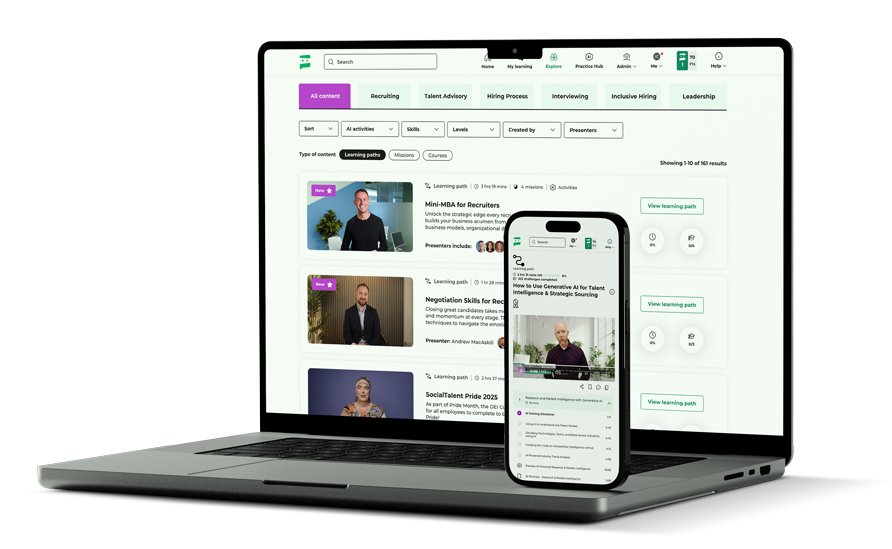
By Johnny Campbell
Interviewing and assessment sit at the beating heart of recruiting. You can find and attract all the candidates you want, but if you get the “assess” part wrong, you’re just shuffling people through a broken process.
And make no mistake – it is broken. It’s inconsistent across interviewers. It’s nearly impossible to measure quality at scale. And it’s been this way for decades. That’s why, if you’re looking for the part of hiring that’s most ripe for further disruption by AI, this is it.
I sometimes break recruiting down into three blunt stages: Find → Assess → Hire. Everyone obsesses over the “find” bit – sourcing channels, employer branding, ad targeting – and I understand why, but it’s the “assess” stage that’s the real gatekeeper. And right now, that gatekeeper is asleep at the wheel in a lot of organizations.
The First Wave: Interview Intelligence
The first real wave of change is already here in the form of interview intelligence tools, something we touched upon in our last newsletter. These smart systems help you define what good looks like, scale it across every single interviewer, and then measure whether those standards are being met.
Think of it as having a silent co-pilot in the room – one that nudges you when to dig deeper, flags when you’ve missed a competency, and quietly keeps score on how consistent you are.
And we need this, because the candidates have already armed themselves with their equivalent. They’ve got AI tools feeding them suggested answers, structuring their responses, even fact-checking in real time. We’re in an AI-powered tech race. And the best part? Interview intelligence doesn’t just keep up – it levels the field and, ideally, raises the floor for everyone.
(Little aside: we’re going to be diving deep into interview intelligence in our next SocialTalent Live, so if this is of interest, sign-up now!)
The Next Step: AI as a Voice in the Room
If you want a crystal ball for where industries are heading in terms of transformation look at sales and marketing. In sales calls, it’s now becoming normal for an AI “colleague” to join live. The AI listens, jumps in with technical answers, and fills in details the salesperson doesn’t have on hand.
Recruiting will go the same way. Picture this: you and a hiring manager are talking to a candidate. Halfway through, the AI chimes in: “Before we wrap, can I ask about your experience with X?” Or the candidate asks, “What’s your parental leave policy?” and the AI answers instantly, with chapter-and-verse accuracy.
Humans still steer the conversation. AI just plugs the gaps, makes sure nothing’s missed, and keeps the whole thing on track. It’s like having a referee who also happens to know every rule in the book and can whisper them to you mid-match.
Screening: The No-Brainer Move
If the idea of AI “co-hosting” an interview feels like a leap, start with screening. Most recruiter screens are black-and-white clarifications:
- Do you have the right to work?
- Can you work these shifts?
- What’s your notice period?
There’s no subjective human judgment here, just information gathering. AI can handle this perfectly – faster, with zero scheduling hassle, and in multiple languages if needed. And let’s be honest, candidates often prefer not having to block 20 minutes to answer questions they could type into a chat.
The point is: start with the easy, low-risk work. That’s how AI earns its place in your hiring process.
From Partial to Full Interviews
Now here’s where it gets interesting. Once AI is showing up in every interview round as an assistant, and doing the screening, it’s a short jump to then giving it the whole first round, isn’t it?
Not for every role, that would be mad (at least not right away!) But for junior hires, grads, or early-stage interviews? Why not? By that point, both the interviewers and the candidates are used to AI being there. Giving it the reins for certain interviews will eventually feel like a natural evolution, not a revolution.
Humans will still be in the loop, reviewing notes, making final calls, handling the high-stakes or high-nuance conversations. But over time, you edge toward what I call the “fully agentic recruiter.” For some companies, I can imagine these movements are perhaps six months away. For others, six years. The deciding factor? Risk appetite.
Risk, Outsourcing, and the Speed of Change
Risk appetite is the big divider. Some organizations move fast, others have been burned by security breaches or compliance headaches, and will take the slow lane.
But there’s a workaround. If you can’t get AI approved internally, you may be able to outsource to RPOs or agencies who can use it right now. I’ve started to see RPO partners pitch themselves as AI-powered extensions of in-house teams, giving clients all the benefits while keeping the tech at arm’s length. It could be a huge differentiator for RPOs in this challenging market.
And then there are the new kids: startups like Mercor and Maki People that run fully AI-driven recruitment services. I saw one that can provide a curated shortlist within seconds, fully vetted, and matched before you’ve even finished your coffee. If it works, why wouldn’t this become the future?
The traditional agency world has always been slow to innovate. These players are moving so fast it’s like watching professional tennis go from line judges to live automated line-calling overnight. Yes, some people miss the human vibe. But if it’s more accurate and faster, how long before everyone just accepts it?
The choice is whether to build, borrow, or buy AI capability – but standing still isn’t really an option. The technology is improving too quickly. The clunky tools you tried six months ago? They’ve already had three upgrades, and they’re far smoother now. Look at how much ChatGPT has evolved from version 3.5 to the current 5 in this report for example – huge improvements across everything from benchmarking on standarized tests, speed, quality, accuracy. The evolution is lightning quick.
The Takeaway for Leaders
We’re past the “will it happen?” stage. AI in interview assessment is inevitable. The only real questions are: how much of it will you let in, and how fast?
If you lead recruiting, start by mapping where humans add the most value: partnering with hiring managers, advising candidates, shaping roles. Then look hard at the middle of your process – the sourcing, the screening, the repetitive assessment – and ask: could AI do this faster, better, more consistently?
Chances are, it can (or it will). And if you’re not at least considering it, your competitors certainly are. The gap between those who embrace this shift and those who don’t ultimately won’t be measured in years, it’ll be measured in months.



